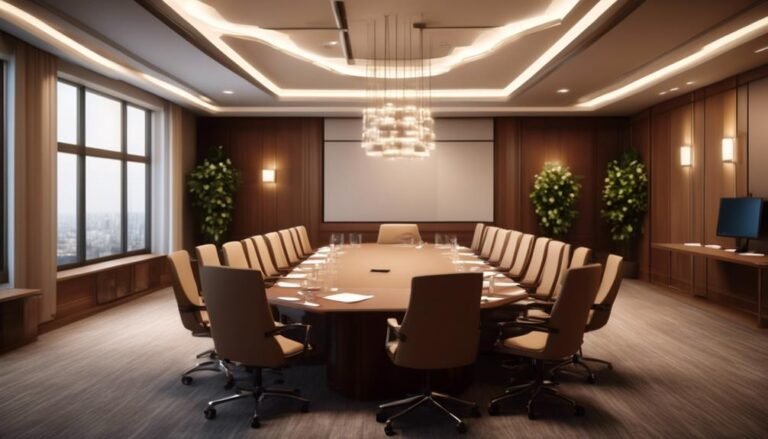The Role of Humor in Enhancing Guest Relations
They say that laughter is the best medicine, and in the world of hospitality, it can also be the key to creating unforgettable guest experiences. The role of humor in enhancing guest relations goes beyond just providing entertainment; it can set the tone for a welcoming atmosphere, diffuse tense situations, and foster positive interactions that leave a lasting impression.
But how exactly does humor contribute to the overall customer experience? Let's explore the significance of infusing humor into guest relations and how it can elevate the service you provide.
Key Takeaways
- Humor is crucial in the hospitality industry as it differentiates establishments from competitors and shapes their identity, creating a memorable experience for guests.
- Humor can help create a welcoming atmosphere by using friendly greetings, paying attention to the physical environment, and personalizing interactions, making guests feel valued and welcomed.
- Humor plays a vital role in diffusing tense situations by breaking tension, redirecting focus, and reducing defensiveness, ultimately fostering amicable atmospheres and creating memorable experiences even in difficult situations.
- Humor lightens the mood, fosters positive interactions, enhances customer experience, and contributes to overall customer satisfaction by promoting positive and relaxed interactions, breaking down barriers, and preventing tensions from escalating.
Importance of Humor in Hospitality
In the hospitality industry, incorporating humor into guest interactions can create a welcoming and memorable experience that fosters strong connections and positive word-of-mouth recommendations. Humor plays a crucial role in branding, as it helps to shape the identity of a hotel or restaurant. By infusing humor into branding efforts, establishments can differentiate themselves from competitors, leaving a lasting impression on guests. This can be achieved through clever and witty taglines, playful social media content, and humorous advertisements that resonate with the target audience.
Moreover, humor is equally vital in marketing within the hospitality sector. It has the power to humanize a brand, making it more relatable to potential guests. By incorporating humor into marketing strategies, such as creating funny and engaging promotional videos or launching humorous advertising campaigns, hotels and restaurants can capture the attention of their audience and leave a lasting impact. When guests associate a positive and enjoyable experience with a brand, they're more likely to return and recommend the establishment to others, thereby contributing to its success.
Creating a Welcoming Atmosphere
Creating a warm and inviting atmosphere is essential for establishing a positive first impression and fostering a sense of comfort and belonging for your guests. When it comes to creating a welcoming environment, keep in mind the following key factors to enhance guest engagement:
- Friendly Greetings: Ensure that your staff warmly greets guests upon arrival. A genuine smile and a friendly welcome can set the tone for a pleasant experience.
- Comfortable Ambiance: Pay attention to the physical environment. Consider factors such as lighting, temperature, and seating arrangements to create a cozy and inviting space.
- Personalized Interactions: Encourage your team to engage with guests on a personal level. Using the guest's name and showing genuine interest in their well-being can go a long way in making them feel valued and welcomed.
- Clear Communication: Provide clear and concise information about your services and amenities. Clearly communicated information helps guests feel at ease and allows them to make the most of their experience.
Diffusing Tense Situations
When tensions run high in guest relations, humor can be a powerful tool for diffusing the situation. It has the ability to break the tension, lighten the mood, and create positive interactions with guests.
Humor as Tension-Breaker
Using humor to diffuse tense situations is an effective way to ease the tension and create a more positive interaction with guests. When faced with conflict, employing humor can help de-escalate the situation and shift the focus towards finding a resolution. In customer complaints, injecting humor can help lighten the mood, making the guest feel heard and valued. Here are four ways humor serves as a tension-breaker in guest relations:
- Redirecting Focus: Humor redirects attention away from the tension, allowing both parties to approach the situation with a fresh perspective.
- Building Rapport: Shared laughter can build rapport, creating a more amicable atmosphere for resolving issues.
- Reducing Defensiveness: Humor lowers defensiveness, making guests more receptive to finding common ground.
- Creating Memorable Experiences: Guests are more likely to remember positive experiences, even in difficult situations, when humor is involved.
Lightening the Mood
To foster a more positive and relaxed interaction with guests, humor can be employed to lighten the mood and defuse tense situations. Humor plays a crucial role in communication, as it helps to break down barriers and create a more open and receptive atmosphere. When tensions run high in guest interactions, using humor can help to ease the situation and prevent it from escalating. It allows for a more light-hearted and amicable exchange, which can ultimately lead to a more positive guest experience.
Additionally, humor can also positively impact team dynamics. It can create a sense of camaraderie among team members, improve morale, and strengthen relationships. By infusing humor into the workplace, it fosters a more enjoyable and cohesive environment, which ultimately reflects in guest interactions.
Creating Positive Interactions
In diffusing tense situations to create positive interactions, employing humor can be a valuable tool for fostering a more relaxed and collaborative atmosphere. When humor is used effectively, it can help to build rapport and enhance communication between guests and staff.
Here are four key ways humor can be used to create positive interactions:
- Breaking the Ice: A well-timed joke or light-hearted comment can help break the tension and open the door for more relaxed communication.
- Showing Empathy: Using humor to acknowledge the tension in a situation while also showing empathy can help guests feel understood and valued.
- Promoting Teamwork: Shared laughter can create a sense of camaraderie and teamwork, encouraging guests and staff to work together to resolve issues.
- Encouraging Positivity: Humor can shift the focus from negative emotions to positive ones, fostering a more optimistic and cooperative atmosphere.
Fostering Positive Guest Interactions
Creating a welcoming and enjoyable atmosphere for guests is essential in fostering positive interactions during their stay. Guest engagement can be greatly enhanced through the use of humor techniques, such as light-hearted banter, amusing anecdotes, and clever wordplay. When guests feel comfortable and entertained, it paves the way for meaningful and positive interactions. In addition to humor, hospitality training plays a crucial role in ensuring that staff members are adept at creating an environment where guests feel valued and appreciated.
| Humor Techniques | Positive Interactions |
|---|---|
| Light-hearted banter | Welcoming atmosphere |
| Amusing anecdotes | Comfortable environment |
| Clever wordplay | Meaningful interactions |
| Appreciation | |
| Hospitality training |
Enhancing Customer Experience
As you focus on enhancing the customer experience, consider how humor can continue to play a pivotal role in creating a memorable and enjoyable stay for your guests. By incorporating humor techniques into your interactions and service delivery, you can significantly impact customer satisfaction.
Here are four ways humor can enhance the customer experience:
- Building Rapport: Using appropriate humor can help you connect with guests on a personal level, creating a warm and welcoming atmosphere that contributes to their overall satisfaction.
- Stress Relief: Humor has the power to alleviate tension and stress, particularly in high-pressure situations. By lightening the mood with a well-timed joke or lighthearted comment, you can ease any potential discomfort and enhance the overall experience for your guests.
- Memorability: Guests are more likely to remember positive and unique experiences. Integrating humor into their stay can make it more memorable, leading to increased customer satisfaction and the likelihood of return visits.
- Positive Reviews and Recommendations: When guests have an enjoyable and memorable experience, they're more inclined to leave positive reviews and recommend your establishment to others, ultimately contributing to improved customer satisfaction and loyalty.
Incorporating Humor in Service Training
When incorporating humor in service training, it's important to focus on training with humor, effective humor techniques, and the impact on guest experience.
Training With Humor
Incorporating humor in service training can enhance engagement and retention of important information. To effectively integrate humor into your training sessions, consider the following strategies:
- Ice Breakers: Start the training with interactive humor exercises to create a positive and relaxed atmosphere.
- Storytelling: Use humorous anecdotes or stories related to the training content to make the information more relatable and memorable.
- Role-Playing: Integrate humor into role-playing activities to lighten the mood and encourage active participation.
- Visual Aids: Incorporate funny visuals or cartoons that align with the training material to add an element of lightheartedness to the session.
Effective Humor Techniques
To effectively incorporate humor into service training, consider employing a mix of ice breakers, storytelling, role-playing, and visual aids to create an engaging and memorable learning experience. When it comes to delivery techniques, focus on using a natural and conversational tone to connect with the trainees. Timing strategies are crucial; humor should be introduced at appropriate moments to maximize its impact. Cultural considerations are important; ensure that the humor used is respectful and sensitive to diverse backgrounds. Language barriers should be taken into account, and efforts should be made to ensure that humor translates effectively across languages. By keeping these factors in mind, you can effectively integrate humor into service training, creating an enjoyable and effective learning environment.
| Delivery Techniques | Timing Strategies | Cultural Considerations |
|---|---|---|
| Natural tone and conversational style | Introduce humor at appropriate moments | Respectful and sensitive to diverse backgrounds |
Impact on Guest Experience
As you consider the impact of humor on guest experience in service training, it's essential to maintain a natural and conversational tone while ensuring cultural sensitivity and respect for diverse backgrounds. Incorporating humor in service training can significantly impact guest experience in the following ways:
- Humor and satisfaction: Introducing humor into service training can enhance guest satisfaction by creating a welcoming and enjoyable atmosphere.
- Guest perception, humor: Guests often perceive humor as a sign of approachability and warmth, leading to positive perceptions of the overall service experience.
- Cultural relevance: It's crucial to ensure that the humor used in service training is culturally relevant and considerate of diverse guest backgrounds.
- Training effectiveness: When humor is incorporated into service training, it can contribute to better engagement and retention of training content, ultimately improving the guest experience.
Leveraging Humor for Memorable Experiences
Leverage the power of humor to create memorable and enjoyable guest experiences. Incorporating humor into branding and marketing strategies can significantly impact how guests perceive and engage with your business. By infusing humor into your brand identity, you can create a more relatable and approachable image, making it easier for guests to connect with your establishment on a personal level. This connection can lead to a stronger sense of loyalty and positive word-of-mouth referrals.
In marketing, humor can be a powerful tool for capturing the attention of potential guests. Clever and funny advertisements are more likely to stick in the minds of consumers, increasing the likelihood that they'll remember your establishment when making their travel plans. Moreover, humor can humanize your business, making it more appealing and inviting to potential guests.
When guests encounter humor during their interactions with your staff or within the ambiance of your establishment, it creates a lasting impression. Memorable experiences often lead to repeat visits and positive online reviews, further enhancing your business's reputation and success.
Therefore, leveraging humor in branding and marketing efforts can truly elevate the guest experience and set your establishment apart from the competition.
Conclusion
In conclusion, humor plays a crucial role in enhancing guest relations in the hospitality industry. By creating a welcoming atmosphere, diffusing tense situations, and fostering positive interactions, humor can significantly improve the customer experience.
For example, imagine a hotel concierge using a lighthearted joke to ease a guest's frustration over a room mix-up, ultimately turning a potentially negative situation into a memorable and positive experience.
Incorporating humor into service training can further leverage its power for creating lasting impressions.




